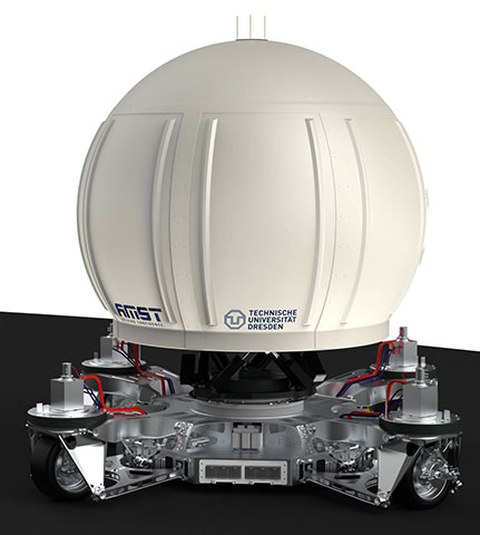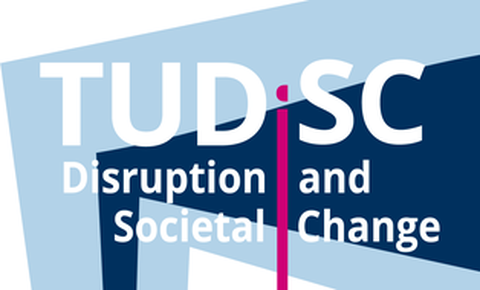Oct 23, 2022
Paving our way to the top with emerging research
Magdalena Selbig / Dagmar Möbius
How is a Cluster of Excellence born? In 2019, TU Dresden identified a number of promising fields of research as part of its Excellence Proposal “TUD 2028 – Synergies and Beyond.”
Its vast landscape of knowledge enables the University of Excellence to pool its research for interdisciplinary research. Such unique confluences give rise to creative and novel approaches to top-level research. These are the four Emerging Fields:
Automated and Networked Mobility, Data-Intensive and Digital Science, Societal Change and Water Research – areas in which TUD can already boast high numbers of publications and extensive third-party funding. By more vigorously propelling this research forward, TUD seeks to make an innovative contribution to solving global challenges. An Emerging Field comprises a scientific network that unites researchers from various disciplines. Their projects are commonly characterized by national visibility right from the start. If a research project is particularly ambitious and pioneering, the responsible Emerging Field can receive strategic support in the form of targeted financial instruments and investments for producing a proposal for the funding of a Cluster of Excellence. The design of an Emerging Field consists of measures such as appointments of key chairs in line with its profile, infrastructural building projects or services like financial consulting. However, Emerging Fields also face a gamut of challenges on the way to becoming a Cluster of Excellence. They must be distinguished with a German Research Foundation (DFG) Research Training Group within three years, acquire a DFG Collaborative Research Center within five years, and submit a promising Cluster of Excellence proposal within seven years.
Automated and Networked Mobility
The objective of the “Automated and Networked Mobility” Emerging Field is to make a decisive contribution to efficient, safe and smart transportation systems. To this end, it is systematically researching future aspects of mobility. The Emerging Field is affiliated with TUD’s “Friedrich List” Faculty of Transport and Traffic Sciences, where it also houses researchers from the fields of traffic behavior, ecology, social sciences, technology, data science, the humanities and governance. Experts there are currently working on modeling mobility patterns in Ukraine. The Chair of Transport Modeling and Simulation and the Chair of Traffic Process Automation have been filled by top-tier international scientists. The “RESTART!” proposal for a DFG Collaborative Research Center has a far-reaching impact on the understanding of how mobility should change with a view to new technologies and the developing social awareness thereof. The goal of the TUD “Smart Mobility Lab” in Hoyerswerda (region of Lusatia) is to give rise to a campus by 2026 where research will be conducted on smart, safe and multimodal emission-free mobility of the future – both on the ground and in the air. In addition to joint projects such as these and networking within the DRESDEN-concept research association, the Emerging Field is now in talks with multiple international universities about strategic partnerships. “Automation and networking are the future of human mobility. This is what motivates the researchers in this Emerging Field,” says Anke Richter-Baxendale, who is responsible for public relations at the Faculty of Transport and Traffic Sciences.
Contact:
Chair of Transport Modelling and Simulation
Prof. S. Travis Waller
Email
Societal Change

One key goal of the Emerging Field “Societal Change” is to explore and understand the effects of processes of societal change.
The Emerging Field of “Societal Change” brings together researchers from political science, sociology, German studies, psychology, sociology, communication, law, computer science, geography, regional planning, design, architecture and philosophy. The focus is on socio-cultural conflict research, on research observing the relation between social dynamics and emotional regimes, and on the research of the interference between culture and disruptive technologies. A newly established Chair of Digital Cultures reflects the social dynamics of digitalization, for instance in the new Master’s degree program in Digital Humanities. Collaboration with the Emerging Fields of Automated and Networked Mobility as well as Water Research is also strategically vital.
Contact:
EXU Emerging Field of “Societal Change”
Dr. Lucas von Ramin
Email
Measure within the Emerging Field: TU Disruption and Societal Change Center (TUDiSC)
The Disruption and Societal Change Center also addresses the outcome of shifts in society (TUDiSC). This milestone project takes a look at disruptivity – a paradoxical fundamental characteristic of social reality that comes to light, for instance, in climate change, digitalization, pandemics, wars or effects of globalization such as economic crises and immigration. Another factor is the further advancement of democracy research, including strengthened collaboration with the Hannah Arendt Institute for Totalitarianism Studies (HAIT). The objective is to develop Excellence-level competitive projects with a particular focus on research that stem from the TUDiSC. TUDiSC is primarily aligned with the humanities as well as social and cultural sciences, but its activities also incorporate expertise from natural, technical and life sciences.
Contact:
Disruption and Societal Change Center (TUDiSC)
Scientific Coordinator
Dr. Karoline Oehme-Jüngling
Email
Water Research
Promising research is materializing from the “Smart Water Systems in an Extreme World” Emerging Field. It is a joint initiative run by TUD and the Helmholtz Centre for Environmental Research (UFZ). In the near future, it will be fortified by two new chairs – the Chair of Data Science in Hydrosystems and the Chair of Hydrosystems Science. Researchers from the Departments of Hydrosciences, Geology and Forest Sciences are exploring the impact of extreme climate-induced water extremes as well as changes in the water cycle and water balance. The target is to strengthen water systems’ resilience while curbing negative effects for humans and the environment to the greatest possible extent. Research and development in this Emerging Field will enable the mitigation of the extreme factors that are already endangering water systems and ecosystems today.
These fields of research are concentrating on:
- The impact of climate-induced changes and extremes on aquatic ecosystems and on pollutant dynamics; possibilities for strengthening resilience through adapted management
- The impact of climate-induced changes and extremes on urban catchment areas and their interaction with natural hydrological catchment areas; possibilities for climate adaptation, goal of “zero pollution”
- Drought-resistant, climate-adapted forests and their role in water balance, management options and forestry
Contact:
Institute of Urban and Industrial Water Management
Coordinator of the Center for Advanced Water Research
Dr. Mareike Braeckevelt
Email
Data-Intensive and Digital Science
The “Data-Intensive and Digital Science” Emerging Field comprises software methods and system architectures for data-intensive research. The focus of this driving force of innovation lies on the Center for Interdisciplinary Digital Sciences (CIDS). In addition, the acquired Center for Scalable Data Analytics and Artificial Intelligence (ScaDS.AI) collaborative project provides support when in working with large amounts of data. This national AI center based in Dresden and Leipzig goes beyond promoting knowledge of artificial intelligence (e.g. through interaction, perception and problem-solving). It also strives for considerable progress in fundamental research and AI applications in industry. The ScaDS.AI Graduate School is significantly advancing the education of the next generation of researchers in this field. Furthermore, funding from the University of Excellence is being used to establish the Synergy of Systems (SynoSys) unit with three new chairs in the realm of digitalization. Fostering experience at the intersections of neurosciences, biomedicine and social sciences will pave the way for future guiding discoveries in interdisciplinary digital science for healthy human development.
Contact:
Chair of Computer Architecture
Prof. Wolfgang Nagel
Email


